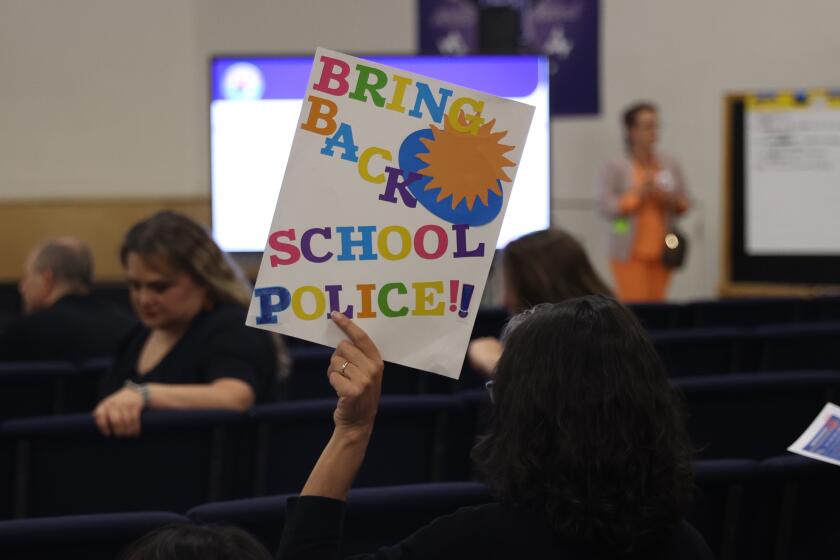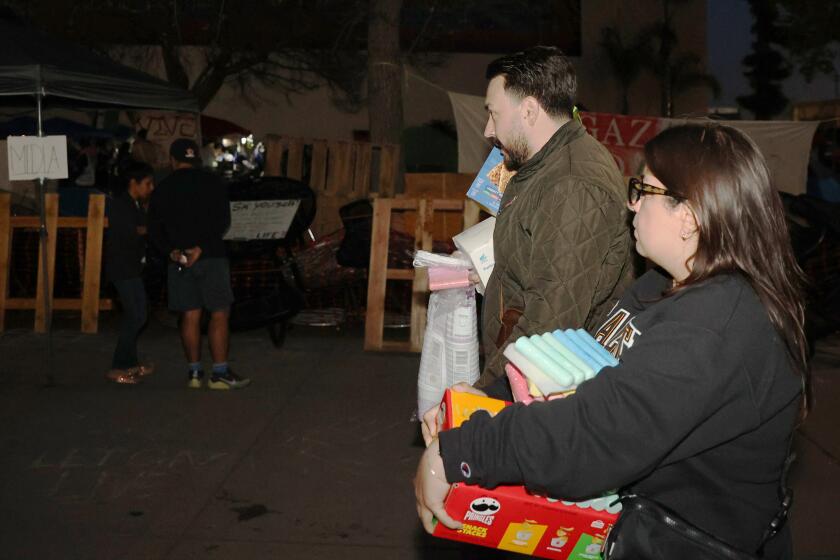Keep God in the Pledge, an Angry Chorus Cries
With as much pomp and circumstance as can be mustered at a sixth-grade graduation, the children strode into the gym. The youngster in the Fat Albert shirt smiled as proudly as the girl in the Mary Janes. Parents bent their necks like flamingos for the perfect snapshot.
And then, suddenly and spontaneously, as the crowd stood for the Pledge of Allegiance, a little slice of Americana turned into a big slab of patriotism.
“I pledge allegiance to the flag,” the crowd at Morse Elementary School began, quietly at first. “And to the republic, for which it stands, one nation, UNDER GOD!”
They screamed it. It used to be a throwaway line, mumbled by generations of children while trying to remember how to pronounce “indivisible.” Now, in this Sacramento suburb and across California, those are fighting words.
On Thursday, a day after the 9th Circuit Court of Appeals declared the Pledge of Allegiance unconstitutional because of the reference to God, the judge who wrote the ruling put his own decision on hold while school officials prepare an appeal.
That did little to appease Californians, who were quickly caught up--some by directing epithets at the father who brought the lawsuit, others by quietly placing their hands over their hearts--in what they view as a constitutional crisis.
“What you’re seeing here is disbelief,” said Dave Schutz, 36, a locksmith who came to Morse School to watch his middle child, Stephanie, graduate to seventh grade. “This is what we built this country on. And I don’t see how one guy, one court or one judge, can make a decision for everybody else. The majority of society believes in a greater being, and the majority of us look to that greater being to protect us and look over us.”
Thursday’s graduation ceremony crowd of about 300 was diverse. Latinos sat next to African Americans, whites next to Asian Americans.
Still, many agreed that the court decision seemed another affront to pride and innocence--no different, they said, from when schools began curbing their emphasis on Christmas during the holiday season.
“What’s next?” asked Sonya Wynne, 36, a Sacramento-area interior decorator watching her 12-year-old niece graduate. “First they took prayer out of school. You can’t have Christmas plays anymore. Now we can’t let God be in anything. That’s why we said the ‘God’ part so loud just now. It has become a very personal issue here.”
Leaders of the Elk Grove Unified School District, south of Sacramento, where the lawsuit that forced Wednesday’s court decision was filed, declared that they will fight the ruling.
Supt. David W. Gordon said he and his attorneys have not decided whether to ask for a rehearing in front of the 9th Circuit or ask to take the case directly to the U.S. Supreme Court. School district leaders said California government attorneys and the U.S. Justice Department have offered their assistance.
“We will fight this ... as long as it takes,” Gordon said at a news conference in the Morse School library.
Sacramento-area resident Michael A. Newdow, a 49-year-old physician by training who says he has put his career on hold to fight the government, brought the lawsuit that led to Wednesday’s decision.
He said he does not want to outlaw the Pledge of Allegiance, but merely to eliminate the words “under God”--which were not in the original version, but were added during the Cold War by Congress and President Eisenhower in 1954.
Newdow’s 8-year-old daughter will wrap up her second-grade year at nearby Florence Markofer Elementary School this week.
Her father said the girl stands for the pledge each morning with her classmates despite his beliefs.
So far, classmates and friends are protecting the girl from being ostracized because of the case, Gordon said, and her mother--Newdow’s former partner, who lives nearby--called the Markofer principal Thursday morning to declare that the girl would attend.
Newdow remained defiant and unrepentant Thursday, saying the angry response that has swept the nation has not swayed him from his cause, adding that there is “nothing more patriotic than fighting to uphold the Constitution.”
Wednesday’s decision prompted scores of people to angrily call Newdow’s home. He said several threatened his life.
Newdow, an atheist, said that the people who left profane messages were those “with God on their side” and that he would urge the callers to “try to understand what this case is all about.”
“They appear to think this is about denying them the opportunity to worship as they choose,” he said. “And it’s quite to the contrary.”
Sacramento police officers stopped by his home Thursday to talk about the threats, and pledged to drive by regularly to ensure his safety.
School officials were quick to condemn the callers Thursday.
“Our democracy is very strong because we allow for dissent,” Gordon said. “Mr. Newdow is challenging this law as he has a right to do.... We’re fighting in court--not on the streets, as goes on in so many other countries.”
That message hasn’t gotten through to everyone.
“I think he’s an idiot,” said Schutz, the locksmith.
Beneath the vitriol, however, school officials, parents and students across California were suddenly forced to confront some very real legal decisions.
Brian D. Myers, for example, an Elk Grove school board member and a deputy district attorney in Sacramento County, made what has become a common argument: that the pledge is a general reference to faith.
“It’s a pledge to faith, as opposed to an individual’s particular deity,” he said. “This just seems to be a very narrow interpretation of the words ‘under God.’ Is Allah God? Yes.... So why can’t this stand for all Gods?”
But what about people who don’t believe in any God?
“I don’t know the answer to that,” Myers said. “That’s a hard one.”
Gordon noted proudly that the Board of Education chooses a hard-working parent or school volunteer to lead the board in the Pledge of Allegiance to begin each of its meetings. Would the board give the honors to a parent who did not want to say the words “under God?”
As school board members, standing behind Gordon and out of his line of sight, nodded quickly in affirmation, Gordon said they would not.
“The pledge is the pledge,” he said.
That was a mantra repeated Thursday across California.
State Sen. William J. “Pete” Knight (R-Palmdale) called the court ruling ridiculous and said he would forge ahead stronger than ever with his efforts to pass a bill requiring schools to recite the pledge each day.
But some educators agree with the ruling.
Ventura County schools Supt. Charles Weis said it makes sense in a multicultural world.
“Saying the pledge reminds us of what this country stands for,” he said. Removing the words “under God,” he said, “enables everyone to demonstrate their patriotism, regardless of their religious beliefs.”
Aaron Stell, a teacher at Grant High School in Van Nuys, where the pledge is said during every home room period, welcomed the ruling.
Stell said he tells his students that they can abstain from saying the pledge. About a third decline to participate. “It shouldn’t be forced on students,” he said.
But for the most part, teachers, parents and students were swept up in the wave of anger and patriotism.
“I feel like a deflated balloon. They just let out my pride,” said Joseph Santana, principal of John Adams Middle School in Los Angeles. “What do we have left if we cannot have respect for our country and demonstrate it outwardly?”
*
Times staff writers Erika Hayasaki, Daniel Yi, Jeff Gottlieb, Jenifer Ragland, David Pierson and Manuel Gamiz contributed to this report.
More to Read
Start your day right
Sign up for Essential California for news, features and recommendations from the L.A. Times and beyond in your inbox six days a week.
You may occasionally receive promotional content from the Los Angeles Times.







